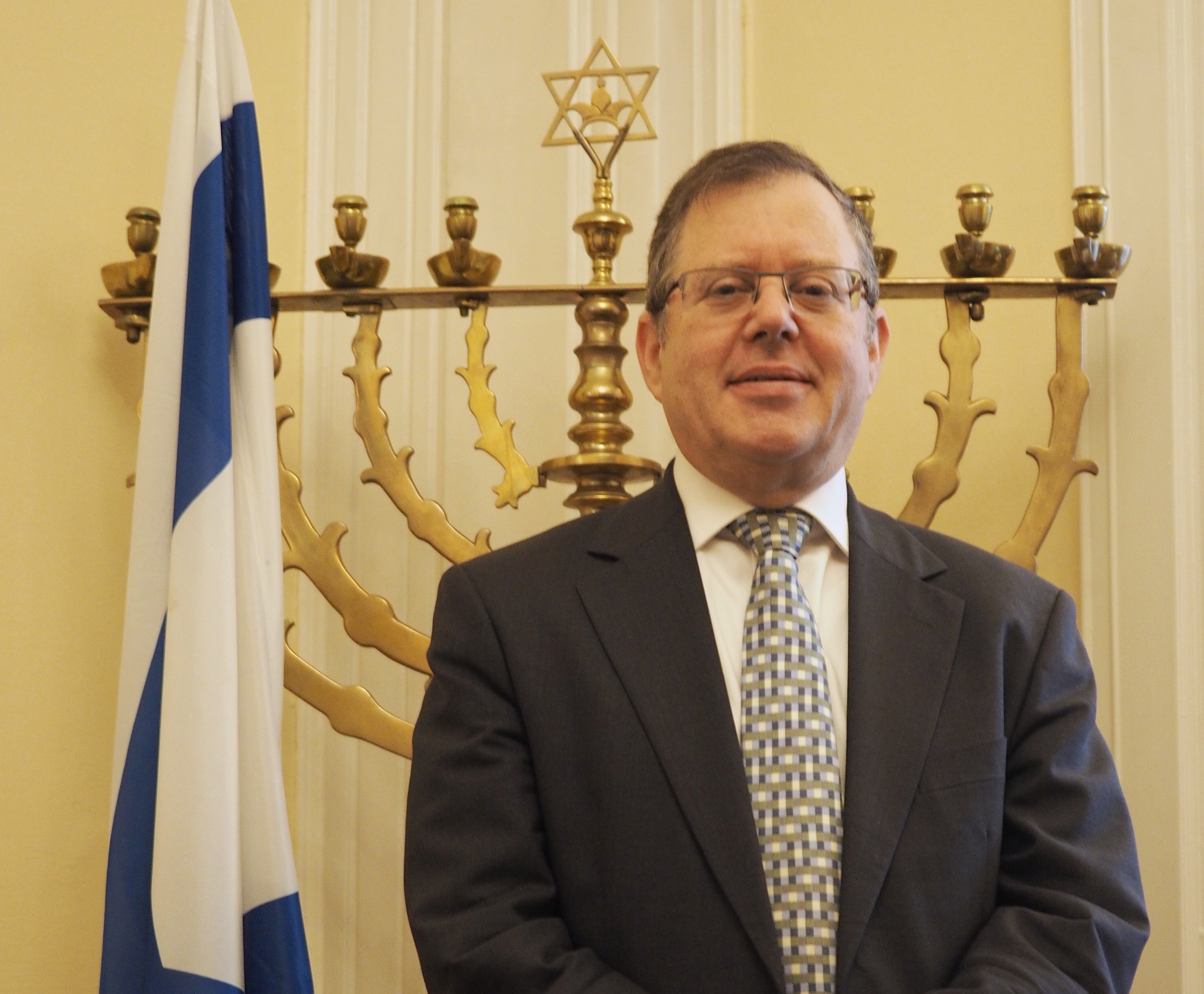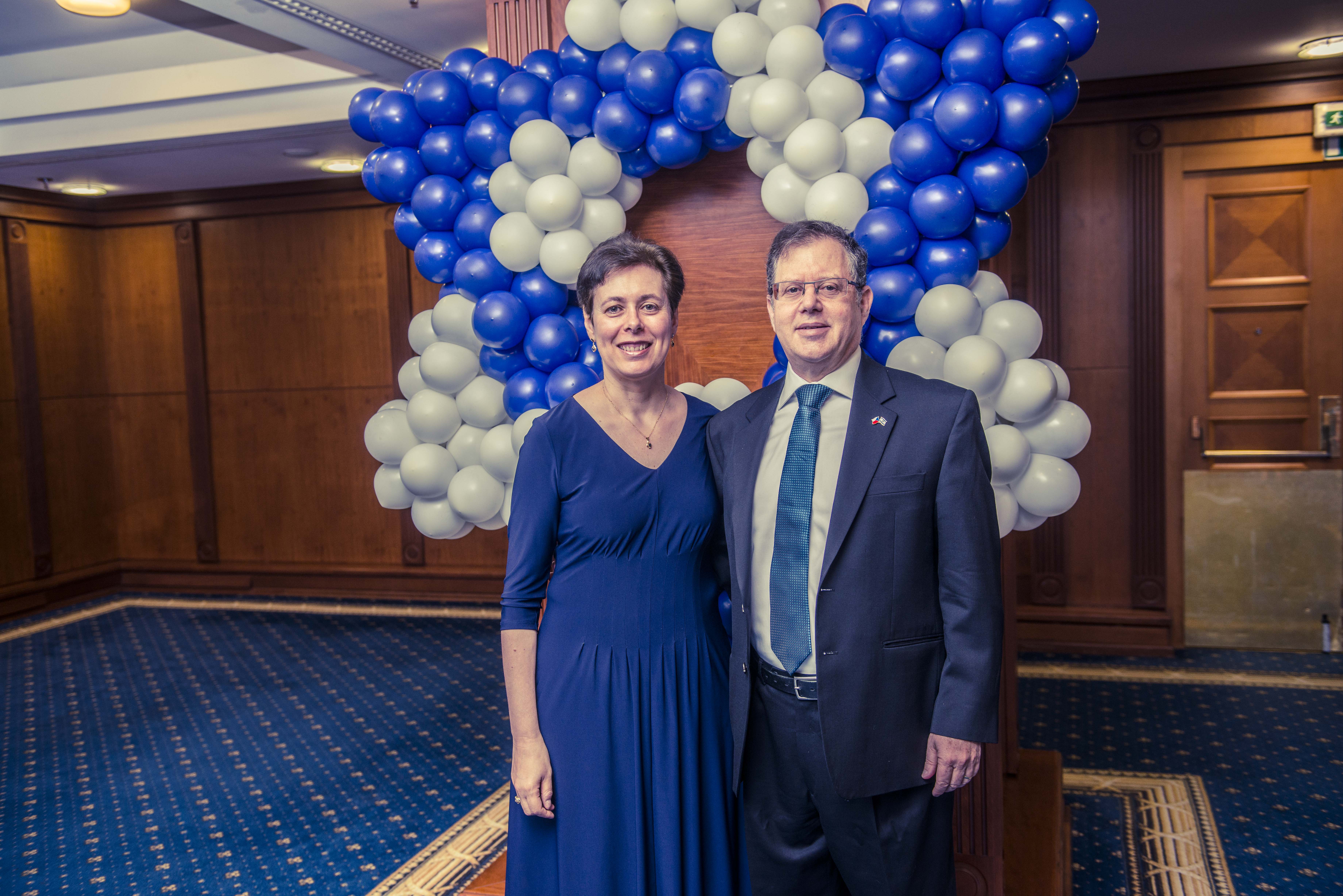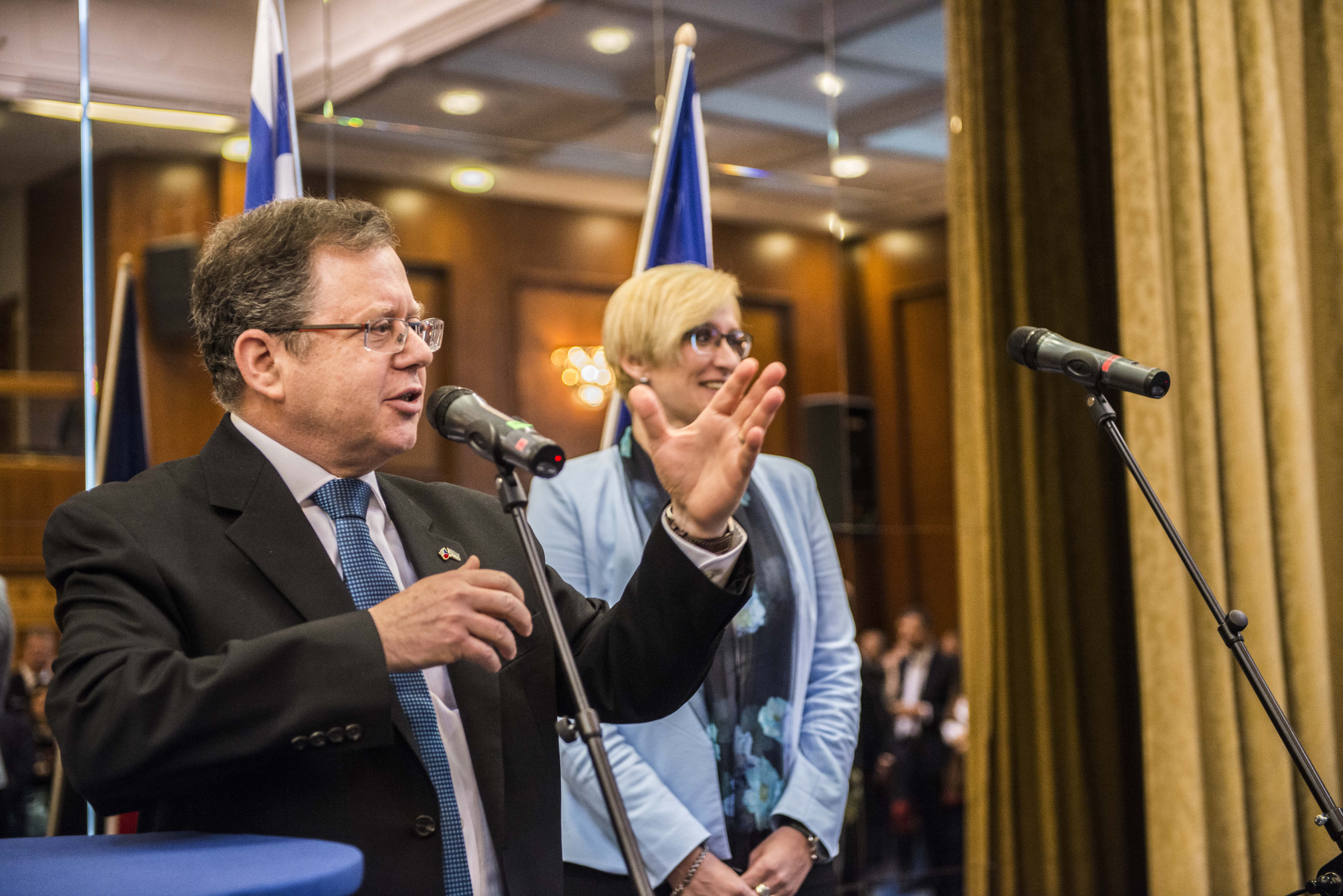Digital diplomacy

H.E. Daniel Meron, Ambassador of Israel in Czech Republic
The fact that each interview is unique is hardly a surprising statement. However it was during my meeting with the Israeli ambassador that I experienced a role reversal; the interview did not start with me asking the prepared questions but Mr. Ambassador asking about me. I was able to experience firsthand the fact known to many: Israeli diplomacy, especially towards the public, is the best in the world. It came as no surprise that Mr. Ambassador, being not only a great speaker but also a very attentive listener, addressed the issues of my interests, beyond the originally outlined questions. Here you can expect some insights on digital diplomacy, women in technology and also a rather refreshing expat view on both Czech society and culture. Daniel Meron has previously worked at Israeli embassies in USA, Norway and Cyprus. In Washington, he was a commissioner for the Congressional affairs, which mediated relations between the Israeli government and the US Congress. In Norway and Cyprus, he held the post of deputy ambassador.
Mr. Ambassador, we started our interview talking about the changing nature of diplomacy in the 21st century and the role of Ambassadors without diplomatic passports, which was the title of my book and a subsequent series of the Czech and Slovak Leaders Magazine. These people are not diplomats yet, by being leading personalities in various domains, they promote and influence the image of a country abroad.
I see the role of such individuals growing and becoming more important. I can name few leading personalities representing Israel: Gal Gadot, an Israeli actress and a model, famous for portraying Wonder Woman in the DC Extended Universe movie; a violinist and a conductor Pinchas Zukerman; and an Israeli professional footballer Eran Zahavi, currently playing in Guangzhou, China. However, even many of my colleagues, being traditional diplomats, are expanding beyond diplomacy. One of my colleagues has just started culinary diplomacy at Twitter, as she likes cooking.
How has diplomacy changed and what is the right diplomacy for the 21st century?
I love this question. Just today, I spoke to our department of digital diplomacy. This department did not exist five or even two years ago and many countries still do not have this department. We put a lot of emphasis on social networks. This is just one example of changing diplomacy due to technology. I am known for challenging the traditional way of diplomatic reporting back via cables. I maintain that we should use more open communication. I believe that headquarters should go to my Facebook, Twitter and Instagram account to find out about my activities in the Czech Republic, rather than waiting for some formal large reports. I see the trend coming, it will take another five to ten years.

H.E. Daniel Meron with his wife Jill Meron
I have seen your Youtube message you used as an introduction to the Czech Republic (you can see it below). Is this the new way of introduction for each Israeli ambassador?
Each new ambassador gets a gift from the Ministry of Foreign Affairs. You get a team of a movie director, a cameraman and a writer of the script. You give them an idea and they prepare the story for you. I come from Jerusalem and I pointed out many similarities between Prague and Jerusalem. One of my colleague is from Tel Aviv, so he talks about the city of tomorrow, regarding the high-tech. Another colleague is a daughter of a Holocaust survivor. She talks about her story and what it means to her to be a diplomat, representing a Jewish state in Europe, having special memories and legacy.
How did it feel shooting a three minute movie and being a star in the spotlight, rather than a diplomat in the background?
It was exciting. It was great to have my daughter joining me for a beer in the market. I have shown this movie to many young people, as I go to schools very often. When young Czechs see this movie, they usually say that they did not have an idea what Israel was all about. I try to convey a message that Israel is a very modern, developed country, in the front line of technology and culture. Some people still had the image of a desert country with camels walking around. Yes, we have camels but we have much more modern features. My daughter is in high tech, now finishing her fourth year at the university, specializing in computer and electrical engineering. She works in Jerusalem in a company designing an autonomous car, also featured in my introduction video. Moreover, she volunteers in a special program at Hebrew University, called QueenB. A group of young Israeli women with high-tech backgrounds decided that there had been enough talking about the need to get young women into sciences, high tech and other technical disciplines, it was time to act. The university students now teach the high school female students, my daughter is teaching coding.
You have mentioned one thing I find disconcerting: the fact that young Czechs do not know Israel. How is that possible, given the fact that the Czech Republic is the closest ally of Israel in Europe? The Czechoslovak and Czech Israeli relations have very long and deep roots. Did we fail to pass on the common history to the younger ones?
I do not wish to compare one generation to another. I believe that the young people know a lot thanks to social media. The Israeli band Lola Marsh had a concert in Acropolis and it was totally sold out, even though it was their first visit to Prague. The culture is known thanks to the personalities. It is rather due to the complexities of the politics in the whole region that makes it more confusing. Let us not forget that during the communist times, it was also challenging to get to the right information. We have to go even further back in time, to Tomas Garrigue Masaryk, his fight in Hilsner affair, him coming to Palestine in 1927 and then the sad history of the Holocaust and its survivors and Jan Masaryk and his fight for the State of Israel, helping displaced Jews come then to Palestine and then sending arms. All this information used to be shared within a generation concerned. Now, it is up to us to teach the younger generation also about these historical events.

H.E. Daniel Meron with Karla Šlechtová, current Czech Minister of Defence
What do you personally do to bridge the knowledge of culture with the knowledge of shared history?
As I mentioned, I visit many schools, I show my introductory video and then I have a presentation. I usually talk about the great relationship between the two countries. I tend to mention three specific examples. Our two countries have a great cooperation in the field of water technology; the Czech Minister of Environment came to Israel has met me and shared his concern about the lack of underground water the Czech Republic is facing. At first, I thought it was a sort of a joke. A country with abundant rainfall, snowfall, with green hills, forest and pastures is coming to a desert nation, asking for advice? It is true that Israel is among the top countries with regards to water technology and water management, practices such as drip irrigation, desalination, reuse of water for agriculture etc. In September 2017, a delegation of 50 people went to Israel to learn about water technology. On the other hand, the Czech Republic can help Israel with ideas for solving the issue of water pollution. ŠKODA AUTO and the automotive industry is the second example of our mutual cooperation. The automotive Czech industry can connect to the digital industry in Israel. They both complement each other. In Israel, there are more than 150 start-ups producing various technological solutions for the automotive industry, such as radars, communications, smart batteries, sensors etc. ŠKODA AUTO will partner with an institution in Tel Aviv and will open an innovation center. By the way, ŠKODA is the third most frequently sold car in Israel. Cyber security is the third domain where we have great exchange of communication and cooperation.
It is often mentioned that the Czech-Israeli relations are the best in history. What can be done to improve already strong and stable relations?
In short, we are further exploring the cooperation that will bring the best from both countries. High-tech, start-ups and scientific cooperation are other areas where we can progress a lot. I know that Czech scientific diplomat, Mrs. Mikolášová, is also featured in this issue, so you are familiar with the exact details of our cooperation in this field. The next topic that is becoming very relevant, is the future of smart cities. And I could continue with many topics from the sphere of economy or commerce which can prosper thanks to mutual cooperation.
How do you like the Czech Republic?
The Czech Republic is a beautiful country. I find the people very friendly and I appreciate the fact that they are friendly and positive toward my country, Israel. Czech culture is not affected by antisemitism. I arrived nine months ago and I have listened to the advice of my friends, recommending me to visit also the countryside. I am proud to say that I have been to all 14 regions. Every second week I leave Prague to get to know the people, visit ancient Jewish synagogues, monuments and cemeteries, attend schools or universities. I love doing that. There are many beautiful places and a lot of Jewish history that is still not very known.
This is also my advice to other foreigners coming to the Czech Republic, make sure you explore the whole country.
By Linda Štucbartová
Photos: Archive

